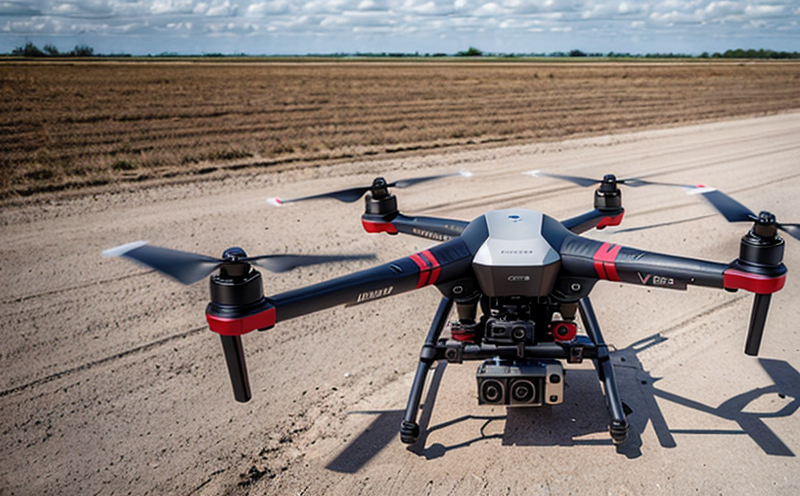ASTM F3298 UAV Remote Identification Testing
The ASTM F3298 standard provides a framework for testing unmanned aerial vehicle (UAV) remote identification systems, which are crucial for enhancing safety and security in the rapidly expanding drone industry. This comprehensive standard ensures that UAVs can be uniquely identified remotely, facilitating tracking and traceability.
ASTM F3298 focuses on ensuring compliance with the Remote Identification (RI) requirements set by the Federal Aviation Administration (FAA) and other regulatory bodies worldwide. The test is designed to evaluate various aspects of a UAV's remote identification system, including:
- System accuracy in generating unique identifiers
- Transmission range and signal strength
- Data integrity during transmission
- Interoperability with ground stations and other UAVs
- Response time under various conditions
The testing procedure involves deploying the UAV in controlled environments to simulate real-world scenarios. This includes urban, suburban, and rural settings, with varying weather and environmental conditions. The goal is to ensure that the remote identification system performs consistently across all these environments.
During the test, multiple parameters are monitored using high-precision instruments such as spectrum analyzers, signal strength meters, and data logging software. These tools help in capturing detailed information about the UAV's performance under diverse conditions. The results of these tests provide critical insights into the system's reliability and effectiveness.
ASTM F3298 testing is essential for manufacturers, operators, and regulatory bodies to ensure compliance with international standards. Compliance is not only a matter of legal requirement but also a vital step in enhancing public trust and safety. By adhering to this standard, stakeholders can contribute to the responsible development and deployment of UAV technology.
The ASTM F3298 testing process involves several steps to ensure thorough evaluation:
- System setup: Configuring the UAV with a compliant remote identification system.
- Environmental calibration: Adjusting test conditions to simulate real-world scenarios.
- Data collection: Monitoring and recording performance metrics under various environmental conditions.
- Analysis: Evaluating collected data against ASTM F3298 criteria.
- Reporting: Compiling findings into a comprehensive report for stakeholders.
The detailed reporting provided by this testing ensures that all parties involved have clear and actionable insights. This transparency is crucial for continuous improvement in UAV technology, fostering innovation while maintaining safety standards.
In conclusion, ASTM F3298 UAV Remote Identification Testing plays a vital role in the advancement of drone technology. By ensuring compliance with international standards, this testing helps to enhance public trust and safety. The rigorous evaluation process guarantees that UAVs meet stringent performance criteria, paving the way for responsible and secure use in various applications.
Eurolab Advantages
At Eurolab, we are committed to delivering world-class aerospace testing services. Our expertise in ASTM F3298 UAV Remote Identification Testing is unmatched, offering several unique advantages:
- Comprehensive Testing Capabilities: We provide a full suite of testing services tailored to meet the stringent requirements of ASTM F3298.
- State-of-the-Art Facilities: Our advanced laboratories are equipped with cutting-edge technology, ensuring precise and reliable test results.
- Experienced Professionals: Our team comprises highly skilled engineers and scientists with extensive experience in aerospace testing.
- ISO/IEC 17025 Accreditation: We are ISO/IEC 17025 accredited, ensuring the highest standards of quality and reliability in our testing processes.
- Customized Solutions: Our services are tailored to meet the specific needs of each client, offering flexibility and adaptability.
- Rapid Turnaround Times: We prioritize efficiency, ensuring that tests are completed within tight deadlines without compromising quality.
Choose Eurolab for your ASTM F3298 UAV Remote Identification Testing needs. Our commitment to excellence and innovation sets us apart in the industry.
Why Choose This Test
ASTM F3298 UAV Remote Identification Testing is essential for several reasons:
- Enhanced Safety: Ensures that UAVs can be uniquely identified, enhancing safety and security.
- Regulatory Compliance: Meets international standards set by regulatory bodies like the FAA.
- Improved Traceability: Provides clear tracking of UAV movements, aiding in the management of flight operations.
- Innovation and Development: Facilitates continuous improvement and innovation in UAV technology.
- Public Trust: Builds confidence among the public regarding the responsible use of drones.
- Market Access: Ensures compliance, opening doors to international markets.
The ASTM F3298 testing process is a critical step in ensuring that UAVs meet the highest standards of performance and reliability. By choosing this test, stakeholders can ensure that their products are safe, compliant, and reliable.
International Acceptance and Recognition
The ASTM F3298 standard for UAV Remote Identification Testing is widely recognized and accepted across the globe. This standard ensures that UAVs can be uniquely identified remotely, enhancing safety and security in the rapidly expanding drone industry.
ASTM F3298 has been adopted by several countries and regulatory bodies, including:
- Australia
- Canada
- European Union (EU)
- New Zealand
- United States of America (USA)
The international acceptance and recognition of ASTM F3298 are crucial for the global drone industry. Compliance with this standard ensures that UAVs can operate safely and securely in diverse environments, contributing to a more responsible and sustainable use of drones.





